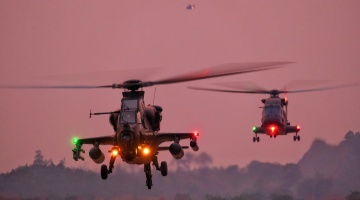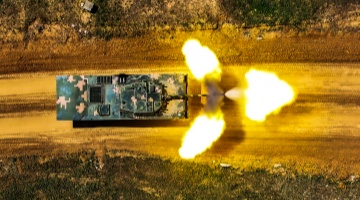By Xu Juanjuan and Huang Jiayu
The Japanese government recently approved the defense budget for 2024, with a total value of 7.9 trillion yen. This marks an increase of over one trillion yen for the second consecutive year. The increase of its annual defense budget is closely associated with Japan's recent military expansion, which will further escalate military competition in the Asia-Pacific region and deal a blow to regional security and stability.
In addition to reaching a record high, Japan's defense budget for 2024 demonstrates fresh features in terms of project allocation and fund utilization.
Accelerating the advancement of "offensive defense". Japan's 2024 defense budget focuses on standoff operations, integrated air and missile defense capabilities, and unmanned equipment, continuing to prioritize the development of so-called counterstrike capabilities and deepen the implementation of "offensive defense". Approximately 1.2 trillion yen is planned to be allocated for enhancing missile attack and defense capabilities, which includes developing precision-guided missiles and hypersonic missiles capable of targeting ships and ground targets, modifying domestic Type 12 anti-ship missiles, equipping Aegis destroyers with Tomahawk cruise missiles, and constructing missile launch bases and new ammunition depots.
Adjusting personnel staffing structure. The Japanese Ministry of Defense stated in its request for the 2024 defense budget that it will adjust the existing force structure, including the command system and staffing, to ensure a seamless transition from peacetime to wartime. The authorized strength of Japan Self-Defense Forces (JSDF) remains the same as in 2023, but there are structural adjustments, resulting in approximately a 26% increase in the number of joint forces. Additionally, the Ministry of Defense and JSDF Affairs Officer will increase by 537 individuals, responsible for Tomahawk cruise missile procurement, Japan-US alliance coordination, and space situational awareness.
Strengthening operational coordination with allies. The increase in defense budget provides Japan with more leeway to bear the cost of US troops stationed there. Japan has established an "integrated command" responsible for commanding the JSDF, aiming to reduce decision-making time and enhance coordination with the US military. It will also directly introduce or jointly develop weapons and equipment with the US military to facilitate joint operational coordination. The JSDF has accelerated its integration into the US military combat system in terms of command structure and weapon interoperability, thus strengthening the cooperative operational capability of the Japan-US alliance.
Currently, Japan's economy is facing significant issues such as slow recovery and inadequate growth momentum. In the context of mounting financial pressures and escalating public debt, the increase in defense budget has sparked dissatisfaction among Japanese citizens. Higher corporate, income, and cigarette taxes are commonly used to fund Japan's defense budget, leading to numerous protests against the government's military buildup.
Benchmarking against NATO's military spending standards, Japan plans to increase its annual security budget to around 2 percent of the country's GDP within five years. This not only demonstrates its ambition to rebuild itself as a military power, but also reveals its intention to serve as a hatchet man for NATO's development in the Asia-Pacific region. Countries in the area remain highly vigilant about Japan's significant increase in defense budget, viewing it as a major challenge to Japan's principle of exclusively defense-oriented posture. This will undoubtedly intensify the security dilemma between Japan and its neighboring countries, heighten the risk of conflicts, and introduce more factors of instability to the regional situation.









